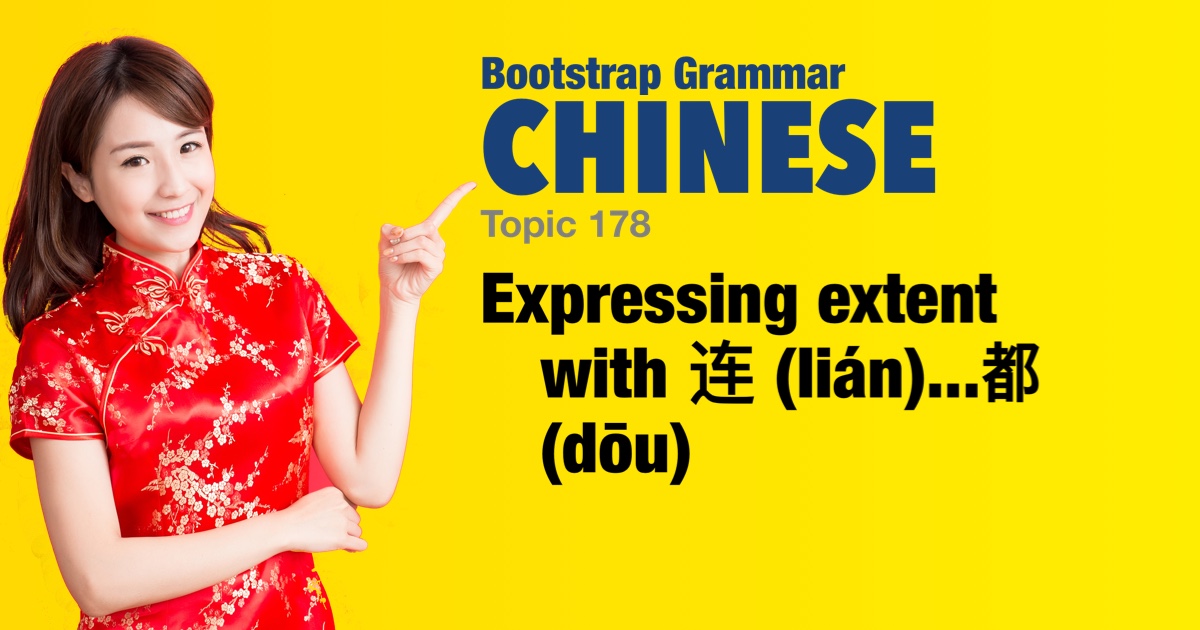Chinese grammar - Expressing extent with 连 (lián)...都 (dōu) |
|||
|
|||
The pattern 连 (lián)...都 (dōu) is used to emphasize the extent or degree of a situation or action. It’s used to highlight a surprising or unexpected situation, emphasizing the extent or degree to which a statement holds true. — It literally translates to 'even' in English. The typical structure is: 连 + [subject] + 都 + [verb/adjective] Or: [subject] + 连 + [object] + 都 + [verb/adjective] Note that 也 (yě) can also be used in place of 都 in this pattern. |
| Examples: | |
|
连她都说英语。
lián tā dōu shuō yīngyǔ. Even she speaks English. |
|
|
连孩子都能做这件事。
lián háizi dōu néng zuò zhè jiàn shì. Even children can do this task.
|
|
|
连老师都不知道这个词。
lián lǎoshī dōu bù zhīdào zhè ge cí. Even the teacher doesn’t know this word.
|
|
|
连孩子都比你聪明。
lián háizi dōu bǐ nǐ cōngming. Even the kids are smarter than you. |
|
|
连他都不知道这件事。
lián tā dōu bù zhīdào zhè jiàn shì. Even he doesn't know about this matter. |
|
|
连老师都没听说过这个地方。
lián lǎoshī dōu méi tīngshuō guò zhè ge dìfāng. Even the teacher hasn't heard of this place. |
|
|
他连米饭都不会煮。
tā lián mǐfàn dōu bú huì zhǔ. He can’t even cook rice. |
|
|
连我都没看见他。
lián wǒ dōu méi kànjiàn tā. Even I didn't see him. |
|
|
连最聪明的学生都回答不出来这个问题。
lián zuì cōngming de xuéshēng dōu huídá bù chūlái zhè ge wèntí. Even the smartest student couldn't answer this question. |
|
|
连昨天他都没吃早饭。
lián zuótiān tā dōu méi chī zǎofàn. Even yesterday he did not eat breakfast. |
|
|
连我们的老板都认为这是个好主意。
lián wǒmen de láobǎn dōu rènwéi zhè shì ge hǎo zhǔyì. Even our boss thinks this is a good idea.
|
|
|
他很穷。连吃饭的钱都没有。
tā hěn qióng.#lián chīfàn de qián dōu méiyǒu. He's so poor. He doesn't even have enough money to eat.
|
|
|
连我都感动得哭了。
lián wǒ dōu gǎndòng de kū le. Even I was moved to tears. |
|
|
连他都不敢试一试。
lián tā dōu bù gǎn shìyíshì. Even he doesn't dare to try.
|
|
|
连我们的校长都参加了这次会议。
lián wǒmen de xiàozhǎng dōu cānjiā le zhè cì huìyì. Even our headmaster attended this meeting.
|
|
|
连他都没去过中国。
lián tā dōu méi qù guò zhōngguó. Even he hasn't been to China. |
|
 |
|


 Literally: Even child all can do this task
Literally: Even child all can do this task
